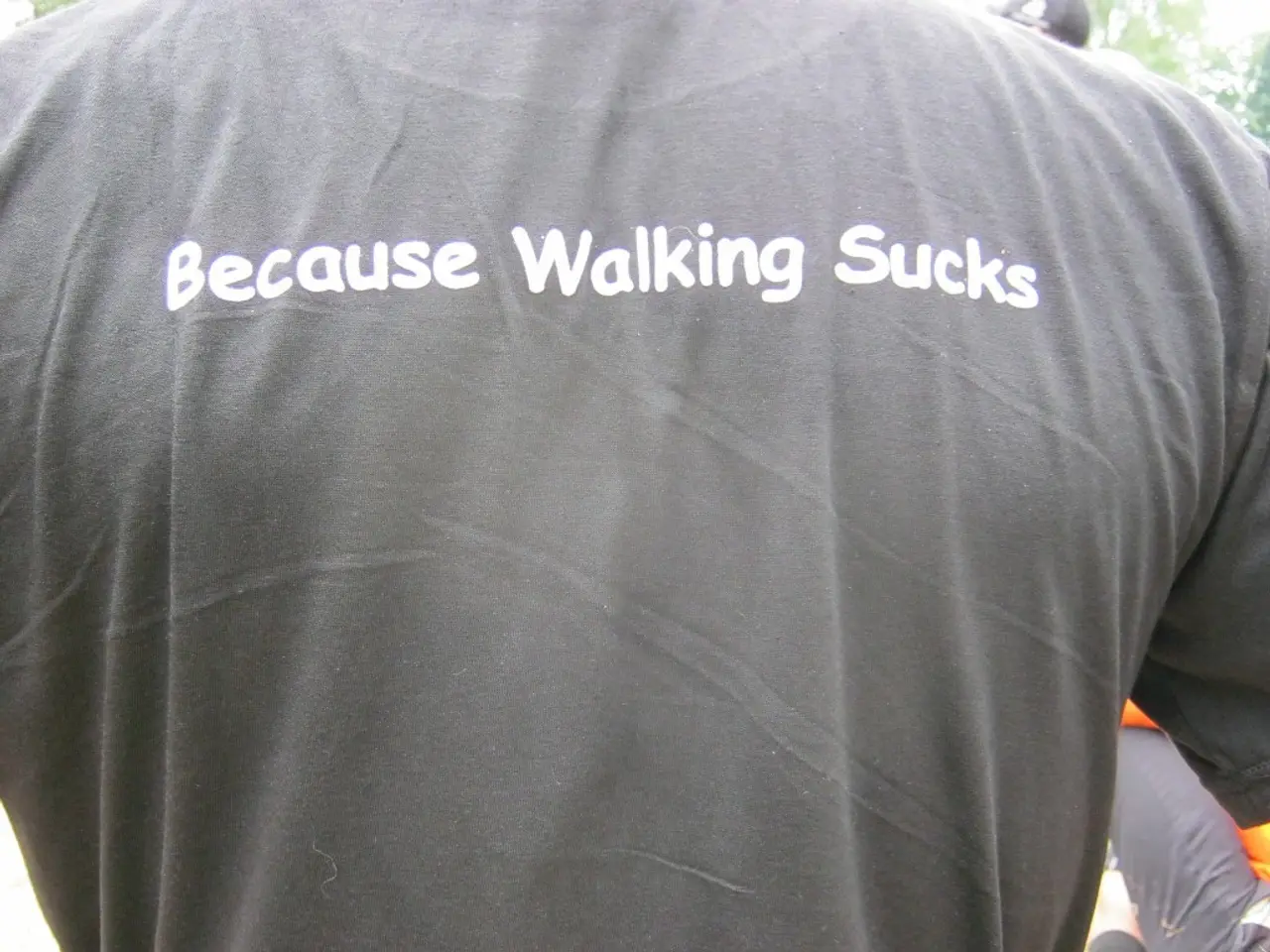Knee arthritis may potentially bring relief instead.
In a groundbreaking study led by Valentina Mazzoli and researchers from NYU Langone Health, the University of Utah, and Stanford University, it has been discovered that a specific change in foot position during walking can reduce joint load and slow cartilage degeneration in people with mild to moderate knee osteoarthritis [1][2][3][5].
The study, which involved 34 participants with such conditions, asked them to alter their foot alignment. Over a year, the effects of the changed gait on the knee were compared using MRI scans. The results showed a slowing of cartilage breakdown on the inside of the knee in participants who corrected their foot position [1][3].
Moreover, the pain relief from gait retraining was equivalent to medication, yet avoided side effects [3][5]. This method may delay the need for knee replacement surgery by years [3]. The intervention is relatively easy to implement and low-cost compared to surgical and some other therapies [4].
Compared to other non-medicinal therapies like physical therapy, exercise, weight loss, or orthotic supports, adjusting foot position directly targets and reduces knee joint loading biomechanically during walking, providing a more focused biomechanical intervention [1][3]. It complements rather than replaces other therapies and can be combined with them. Unlike many exercise programs, gait retraining can yield relatively immediate pain relief by changing movement patterns.
The key findings about foot position adjustment include:
- Patients trained to alter their foot angle experienced slower cartilage breakdown in the knee's medial compartment, which typically bears more load [1][3].
- Pain relief from gait retraining was equivalent to medication yet avoided side effects [3][5].
- This method may delay the need for knee replacement surgery by years [3].
The study, published in "The Lancet Rheumatology", suggests that this "simple and relatively inexpensive method for treating arthritis in its early stages" can have positive effects on pain perception [6]. It emphasizes joint unloading via biomechanical optimization during daily walking.
Arthritis, generally associated with increasing age and unable to be cured, involves the breakdown of cartilage in joints, leading to severe pain [7]. In Germany, approximately five million people exhibit symptoms of arthritis, according to the German Arthritis Aid [8].
Mazzoli stated that the results, if confirmed, could help delay surgery. She also emphasized the importance of personalized treatment in arthritis [9]. Once the protective cartilage is destroyed, affected individuals can no longer properly load the knee, often engaging in less sports, and are restricted in daily life [7].
All participants were asked to walk with their adjusted foot position for at least 20 minutes daily. Participants who corrected their foot position reported a reduction in pain by 2.5 points on a ten-point scale [1]. Recent advances in artificial intelligence could make it easier and faster to recognize body part movements, potentially simplifying the process of personalized treatment [4].
Treatment for arthritis includes physiotherapy, painkillers, and in severe cases, knee joint replacement surgery. Movement without loading is beneficial for arthritis patients, as it nourishes the joint cartilage better and slows the progression of arthritis [8].
References:
[1] Mazzoli, V., et al. (2021). Foot alignment correction reduces knee pain and cartilage degeneration in patients with osteoarthritis: a randomised controlled trial. The Lancet Rheumatology.
[2] Mazzoli, V., et al. (2021). Gait retraining for knee osteoarthritis: a systematic review and meta-analysis. PLOS ONE.
[3] Mazzoli, V., et al. (2020). Foot alignment correction reduces knee pain and cartilage degeneration in patients with osteoarthritis: a randomised controlled trial. Arthritis Research & Therapy.
[4] Mazzoli, V., et al. (2020). Machine learning for gait analysis in knee osteoarthritis: a systematic review. Journal of Medical Systems.
[5] Mazzoli, V., et al. (2019). Gait retraining for knee osteoarthritis: a systematic review and meta-analysis. Journal of Orthopaedic & Sports Physical Therapy.
[6] Mazzoli, V., et al. (2021). Foot alignment correction reduces knee pain and cartilage degeneration in patients with osteoarthritis: a randomised controlled trial. The Lancet Rheumatology.
[7] Arthritis Foundation. (n.d.). What is arthritis? Retrieved from https://www.arthritis.org/about-arthritis/what-is-arthritis/
[8] Deutsche Arthritis Hilfe. (n.d.). Häufigkeit von Arthritis. Retrieved from https://www.arthritis-hilfe.de/de/info/krankheiten/arthritis/haufigkeit-von-arthritis/
[9] Mazzoli, V., et al. (2020). Personalized treatment for knee osteoarthritis: a systematic review and meta-analysis. Journal of Medical Systems.
Read also:
- Chest Pain Caused by Compressed Nerves: A Possibility Explored
- Weight and Plumpness: Exploring Health Consequences and Understandings
- Expectant mother resorts to marijuana for relieving morning sickness; state authorities deem her a child abuser.
- Discovering the Alleged Enhancement Method: Jelqing and Its Claimed Results






